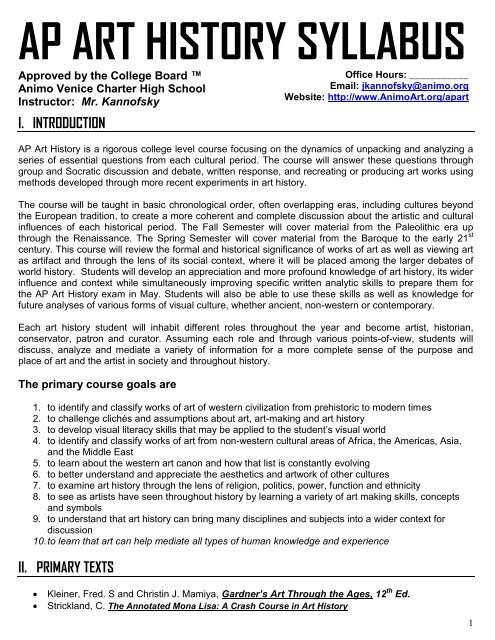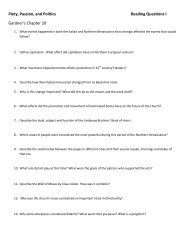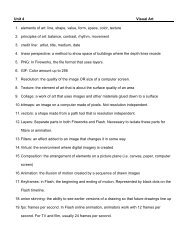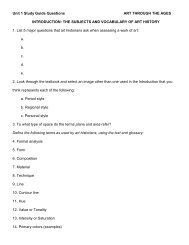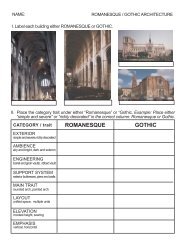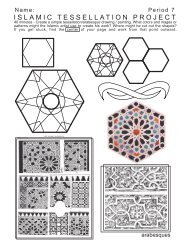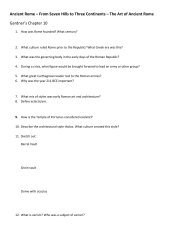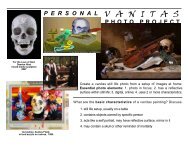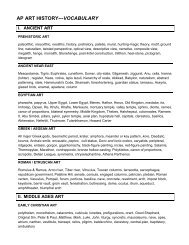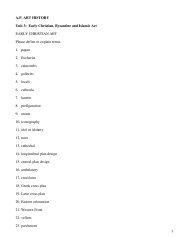AP ART HISTORY SYLLABUS
ap art history syllabus - Animo Art
ap art history syllabus - Animo Art
Create successful ePaper yourself
Turn your PDF publications into a flip-book with our unique Google optimized e-Paper software.
<strong>AP</strong> <strong>ART</strong> <strong>HISTORY</strong> <strong>SYLLABUS</strong>Approved by the College Board Animo Venice Charter High SchoolInstructor: Mr. KannofskyI. INTRODUCTIONOffice Hours: ___________Email: jkannofsky@animo.orgWebsite: http://www.AnimoArt.org/apart<strong>AP</strong> Art History is a rigorous college level course focusing on the dynamics of unpacking and analyzing aseries of essential questions from each cultural period. The course will answer these questions throughgroup and Socratic discussion and debate, written response, and recreating or producing art works usingmethods developed through more recent experiments in art history.The course will be taught in basic chronological order, often overlapping eras, including cultures beyondthe European tradition, to create a more coherent and complete discussion about the artistic and culturalinfluences of each historical period. The Fall Semester will cover material from the Paleolithic era upthrough the Renaissance. The Spring Semester will cover material from the Baroque to the early 21 stcentury. This course will review the formal and historical significance of works of art as well as viewing artas artifact and through the lens of its social context, where it will be placed among the larger debates ofworld history. Students will develop an appreciation and more profound knowledge of art history, its widerinfluence and context while simultaneously improving specific written analytic skills to prepare them forthe <strong>AP</strong> Art History exam in May. Students will also be able to use these skills as well as knowledge forfuture analyses of various forms of visual culture, whether ancient, non-western or contemporary.Each art history student will inhabit different roles throughout the year and become artist, historian,conservator, patron and curator. Assuming each role and through various points-of-view, students willdiscuss, analyze and mediate a variety of information for a more complete sense of the purpose andplace of art and the artist in society and throughout history.The primary course goals are1. to identify and classify works of art of western civilization from prehistoric to modern times2. to challenge clichés and assumptions about art, art-making and art history3. to develop visual literacy skills that may be applied to the student’s visual world4. to identify and classify works of art from non-western cultural areas of Africa, the Americas, Asia,and the Middle East5. to learn about the western art canon and how that list is constantly evolving6. to better understand and appreciate the aesthetics and artwork of other cultures7. to examine art history through the lens of religion, politics, power, function and ethnicity8. to see as artists have seen throughout history by learning a variety of art making skills, conceptsand symbols9. to understand that art history can bring many disciplines and subjects into a wider context fordiscussion10. to learn that art can help mediate all types of human knowledge and experienceII. PRIMARY TEXTSKleiner, Fred. S and Christin J. Mamiya, Gardner’s Art Through the Ages, 12 th Ed.Strickland, C. The Annotated Mona Lisa: A Crash Course in Art History1
III. SUPPLEMENTAL TEXTS / RESOURCESArt History Survey Website: http://witcombe.sbc.edu/<strong>ART</strong>HLinks.html<strong>AP</strong> Art History Course website: http://www.animoart.org/apartBarnet, Sylvan, A Short Guide to Writing about Art. Harper CollinsCarey, John. The Farber Book of Utopias. London: Farber and FarberClark, Kenneth. Civilisation. New York: Harper Perennial.IV. GRADING SCALEA 88 - 100% AdvancedB 87 - 78% ProficientC 77 - 68% BasicD 67- 58% Below BasicF 57 – 0 % No creditV. CLASS REQUIREMENTS AND EXPECTATIONSA. Class starts BEFORE the tardy bell.B. Pop quizzes may be given at the beginning of many classes.C. You can only make-up an exam within one week of it being given.D. Academic Integrity: You are expected to do your best work and not copy, lie, cheat, stealfrom other students.E. Cheating Policy: First incident, the student receives a “zero” on the assignment. Meeting withparent. Second incident, the student fails the unit test. May fail semester. Discussion withparent necessary.F. Check the class website or speak with study partner to obtain any missing work.G. Study Partner: Meet with once a week.H. Note-taking: Organize all notes & handouts in your notebook at the end of EACH DAY. Usethe Cornell note taking method.I. Complete study cards, questions, web quests and all other handouts before test.J. Office Hour Support & Workshops: Tuesdays only.K. Spend 1 office hour per week working on your study cards / study questions. You areexpected to take the initiative if you need help. Additional help/tutoring/instruction will beprovided ONLY during office hours.VI. GENERAL UNIT ASSIGNMENTSA. Unit Reading HandoutB. Studio Project / PostersC. Short Responses / EssaysD. UNIT EXAM – Multiple choice, short essays (similar to official <strong>AP</strong> exam in May)Once a semester, groups are responsible for a unit: introductory information, images, and connections.VII. WEBSITE SUPPORTA. All assignments and course supports are posted online.B. Students will be responsible for all information on the course site including the online textbook.2
VIII. ASSIGNMENTS 10 PT. QUIZZES. Given inconsistently at the beginning of class. No make-up. COURSE UNITS. Each group of students is responsible for one unit per semester. HOOKS. Unit group responsible for introductory information for class: handouts, images, etc. EXAMS. Each test includes slide identification, multiple choice, and essays. See the test dates onthe website course schedule. HOMEWORK AND CLASSWORK. Study cards AND study guide questions – ½ - 1 pt. each.Study cards and guide questions should be completed during class and as homework. All unitstudy cards and study guide questions are due on the day of the unit exam. CLASS FIELD TRIPS are mandatory. You will write a reflection based on your experience. EXTRA CREDIT WORKSHOPS: Five Point Workshops are twice a month during Tuesday officehours. These workshops’ content varies and may include film viewing and analysis, student workanalysis, poster creation, a writing workshop or art technique. Check the website / window calendarfor dates. EXTRA CREDIT ONLINE QUIZZES: Students can receive 5 points of extra credit for each onlinequiz per unit. Students must receive 100% on the quiz and send the results by email prior to the inclassquiz to receive credit. FINAL ESSAY / PROJECT: Given in late May after <strong>AP</strong> Exam. Only completed work accepted for possible full credit. Late work will lose 20%.IX. GENERAL CLASS SCHEDULEFIRST HALF1. Warm-up: Question/Term / slide analysis Writing / Academic 10 minutes2. Discussion of questions Discussion 5 minutes3. Hook: Student created / Student Led Presentation 10 minutes4. Reading: work on cards / worksheet Reading/Writing 20 minutesSECOND HALF5. Lecture / Note-taking / Socratic dialogue Notes/discussion 25 minutes6. Studio Work / Socratic Seminar Project based 15 minutes7. Finale: Discussion - Exit Questions Discussion/Notes 10 minutesX. REVIEW SESSIONS SATURDAY WORKSHOPS: October 5, December 14, May 3 (alternative) 826LA Review: May 5 (alternative) CST Review Dates: One three hour review session the week of April 28 FINAL EXAM: Saturday, April 26***This syllabus will develop and adapt to the needs of the student. Some information above maychange over the course of a school year.3
<strong>AP</strong> <strong>ART</strong> <strong>HISTORY</strong> - PARENT/STUDENT/TEACHER CONTRACTBy signing this form, I acknowledge that I have read and understood everything in this syllabus. Iunderstand that I will be assigned a textbook, art materials, a computer, a computer mouse andpower cord during the semester and that I am responsible for these tools and materials from themoment I pick them up until I drop it off at the end of the period.Student Name:Period:Student Signature:Parent/Guardian Name:Parent/Guardian Signature:Texbook #:________________Computer #: ______________Mouse #: ________________Teacher Signature: ________________Return to instructor by August 19, 20135


